Curious which install choices give the best long-term performance for a busy kitchen?
This guide helps homeowners plan, select, and install a stainless steel sink with professional confidence. It covers mounting types, sizing, gauge, tools, and step-by-step practices that prevent leaks and flex.
Readers learn why T304—an alloy with about 10% chromium and 18% nickel—matters for corrosion resistance and durability. The guide compares undermount, top-mount, and farmhouse aprons, and it shows how Kohler lines like Vault and Strive and Houzer options affect fit and accessories.
Targeted at DIY-savvy homeowners and metal workers, the text explains drain alignment, sound control, and finish care. Daily wipe-downs with warm water and mild soap keep a kitchen sink looking new and reduce mineral buildup.
Outcome: follow these steps and you’ll choose the right product, prepare accurately, and complete an installation that is watertight and built to last.
Shop Stainless Steel Kitchen Sinks by Mounting Style
Choosing the right mounting style defines a kitchen’s look and daily cleanup routine. This section explains common mounts and how each affects design, functionality, and fit.
Undermount options for clean, modern lines
Undermount basins create a seamless edge with stone and solid surfaces. They favor quick wipe-downs and a minimalist profile in a stainless steel kitchen.
Consider Kohler Strive models like the K-33158-NA (32″ undermount single-bowl) for a refined range of contemporary options.
Top-mount and drop-in choices for easy upgrades
Top-mount frames simplify retrofits on laminate counters. Vault models offer top-/undermount versatility—see the K-3821-3-NA 33″ top-/undermount single-bowl for flexible installs.
Farmhouse short-apron for a pro-inspired look
Short-apron undermounts give that professional front exposure without deep cabinet changes. Vault offers 29-1/2″ and 35-1/2″ short-apron undermounts for bold visual weight.
Practical selection tips:
- Start with countertop material and cabinet width before choosing mount style.
- Use manufacturer templates to confirm cutouts and avoid surprises.
- Choose models with factory-applied pads to reduce noise, especially for undermount installations.
Find Your Fit: Single Bowl vs. Double Bowl Configurations
Choose the basin layout that matches how the household cooks and cleans—this simple decision changes daily workflow.
Single-bowl workstations favor cooks who handle large pans and heavy pots. Kohler Strive offers undermount single-bowl sizes like the 32″ K-33158-NA and several workstation models that add sliding ledges and accessories.
Why it helps: one large basin improves handling of sheet pans, stockpots, and roasting trays. Workstation ledges turn the bowl into a prep center without widening the cabinet footprint.
Double-bowl options for multitasking
Double-bowl layouts separate tasks—wash on one side, rinse or dry on the other. Kohler Vault Smart Divide models (K-3838-3-NA, K-3839-3-NA and farmhouse K-3945-NA) use a lower center partition to keep pans maneuverable.
- Functionality: split basins support multi-user kitchens and constant meal rotation.
- Undermount fit: both single and double configurations install cleanly as undermounts for easier counter wipe-downs.
- Accessory planning: choose compatible grids and racks to protect the base and reduce noise.
Assess your workflow: stage multiple prep tasks or need room for oversized ware? Let real kitchen patterns drive the selection. For resale, Smart Divide models often appeal to buyers who value multitasking, while large single-bowl workstations attract serious home chefs.
Gauge Stainless Steel and Material Quality Explained
A practical mix of gauge and alloy delivers long-term performance in busy home kitchens.
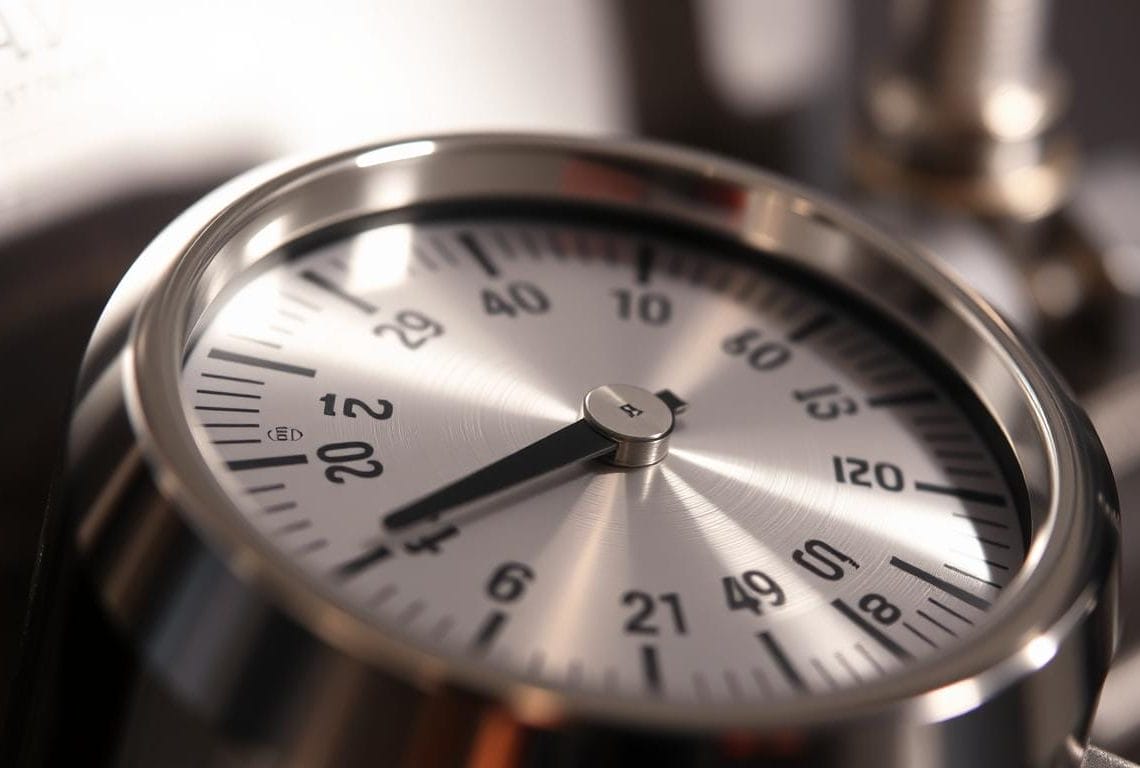
Why 18-gauge T304 delivers durability
Eighteen-gauge is a common choice for residential bowls. Lower numbers mean thicker metal—18 resists denting, vibration, and flex during installation.
Real-world example: Houzer’s LTS-2522-1 is 18-gauge T304 at 25″ x 22″ x 12″ deep, showing how thickness keeps walls stable under daily loads.
Chromium and nickel content for corrosion resistance
T304’s alloy—about 10% chromium and 18% nickel—forms a protective film. That passive layer prevents rust and keeps surfaces bright in wet environments.
- Finish stability: thicker gauge holds a uniform grain during polishing.
- Installation feel: less flex when securing undermount fasteners yields a consistent seal.
- Maintenance: balanced gauge and T304 make wipe-downs and mineral removal easier.
Tip: always verify spec sheets for gauge, alloy, and finish before purchase to avoid surprises.
stainless steel sink Sizes and Depths for Every Kitchen
Width categories and depth ranges guide homeowners to options that work in compact bars and large farmhouse kitchens alike.
Less than 33 inches: Ideal for compact kitchens, secondary prep zones, and bar areas. These models fit narrow base cabinets and keep plumbing runs short.
Standard 33 inches
Many homeowners choose the 33″ range for straight retrofits. Kohler Vault offers several top-/undermount options at this width for easy replacement.
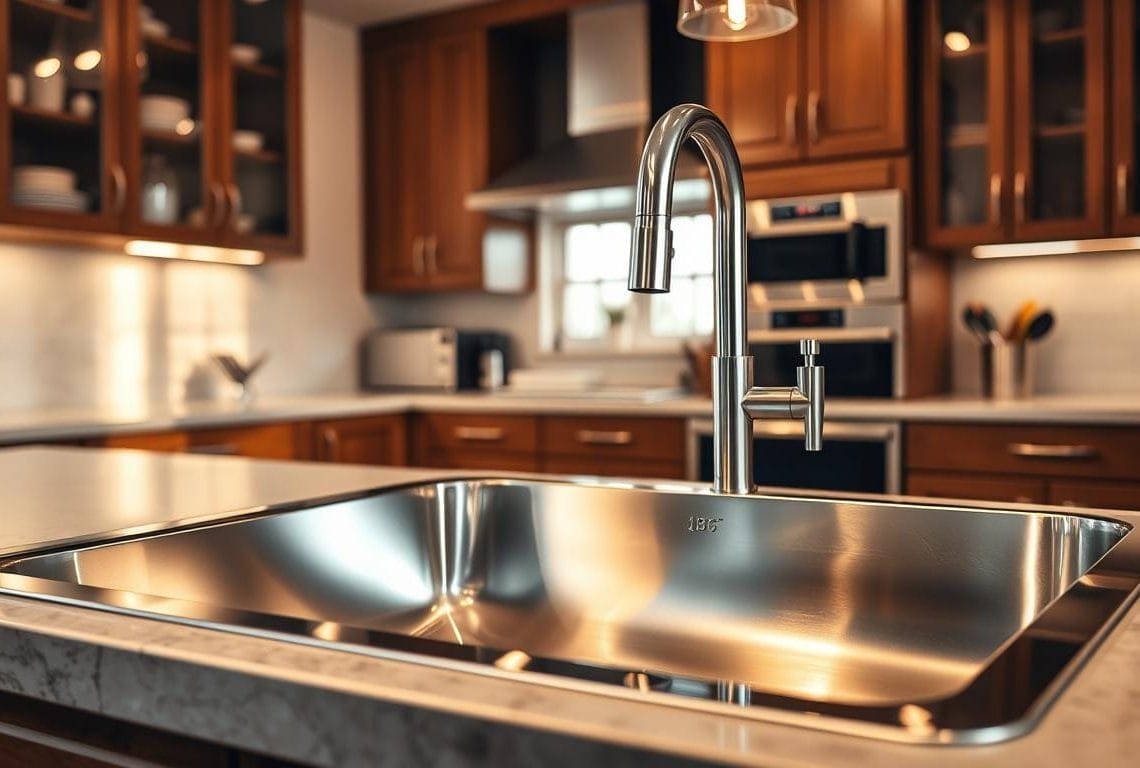
Greater than 33 inches
Oversized single or double bowls suit large kitchens and farmhouse layouts. Verify base cabinet width, apron clearance, and appliance adjacency before ordering.
Depth matters
Depth choices affect ergonomics and capacity: under 7″ for bars, 9–10″ for everyday kitchen tasks, and >10″ for oversized pots. Deeper bowls often use 18-gauge T304 to resist flex when full.
- Undermount considerations: check cabinet rail clearance and disposal height.
- Drain position: rear-set drains free cabinet floor space; centered drains ease retrofits.
- Template & reveal: confirm cutouts and reveal type to control drips.
Plan ahead: measure appliance swing, faucet reach, and allowance for grids to protect the finish and boost drying space.
Featured Collections and Models to Consider
Compare flagship lines to find the model that fits your cabinet, workflow, and style.
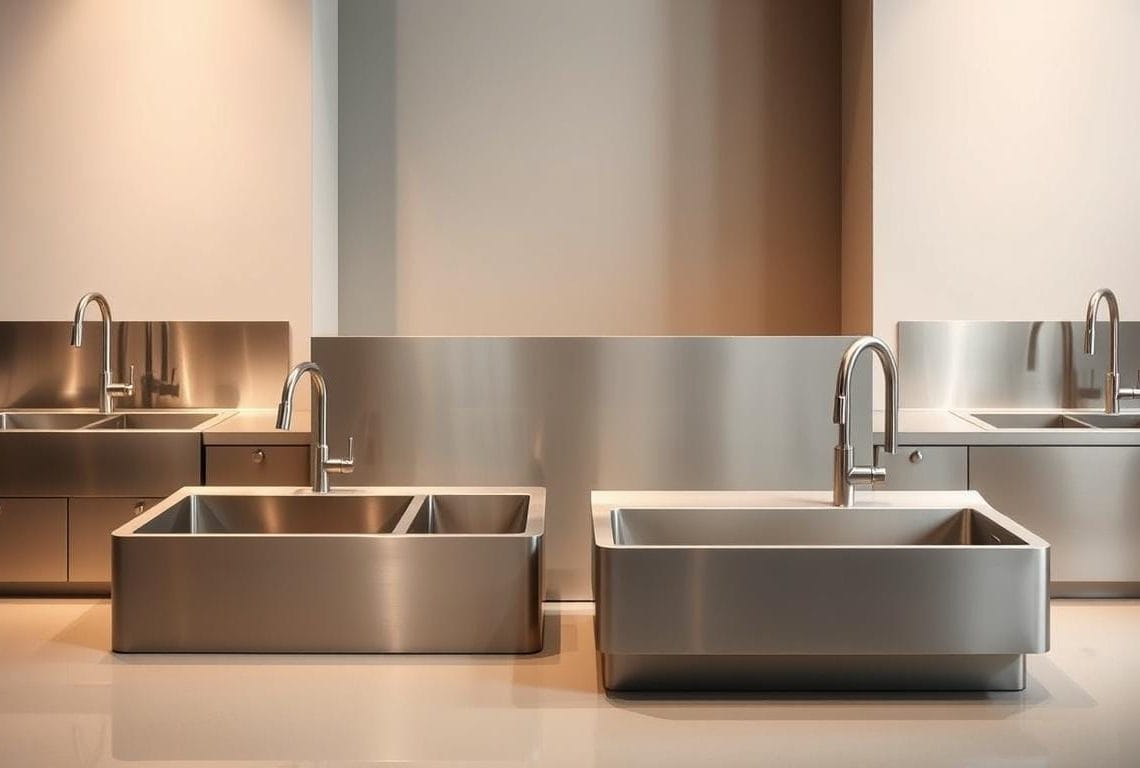
Kohler Vault — retrofit-friendly versatility
Vault offers top-/undermount options that simplify retrofits and new builds. Select single or double configurations at 33″ or larger to match common cabinet widths.
Notable picks: K-3821-3-NA (33″ single) and K-3820-3-NA (33″ double). Farmhouse short-apron models like K-3936-NA and K-3943-NA deliver bold design with shallower cabinet impact.
Kohler Strive — undermount workstations and accessories
Strive blends sleek basins with an accessory ecosystem for prep work. Choose K-33158-NA (32″ single) or K-33160-NA (32″ double) for clean undermount profiles.
Workstation options (K-33656-PC-NA, K-33657-PC-NA, K-33658-PC-NA) add built-in ledges for racks, cutting decks, and drying trays—expanding function without widening the cabinet footprint.
Houzer highlights — Medallion, Glowtone, Novus
Houzer lines focus on reliable alloys and satin finishes for consistent appearance and performance. Medallion and Glowtone cover single and double bowls in common openings.
The Novus NVS-5200 sliding dual-deck workstation ships with accessories and hits a competitive price point for serious prep zones.
- Selection tip: start with cabinet size and mount type, then confirm accessory compatibility.
- Spec habit: always check cutout templates and minimum widths before ordering.
- Aesthetic cue: match finish grain direction with nearby appliances for a cohesive design.
Installation Essentials for Homeowners
A precise install starts with planning: gather tools, confirm measurements, and follow the template.
Tools, templates, and top-mount cutout basics
Gather tools: template, jigsaw or track saw, drill, clamps, silicone or hybrid sealant, mounting clips/brackets, level, painter’s tape, and PPE. Verify fasteners included with the selected model.
Template first—tape it in place and confirm clearances for faucet holes, backsplash, and dishwasher. Trace, test-fit, then cut. For top-mount installs, cut slightly inside the line and apply a continuous bead of sealant under the rim.
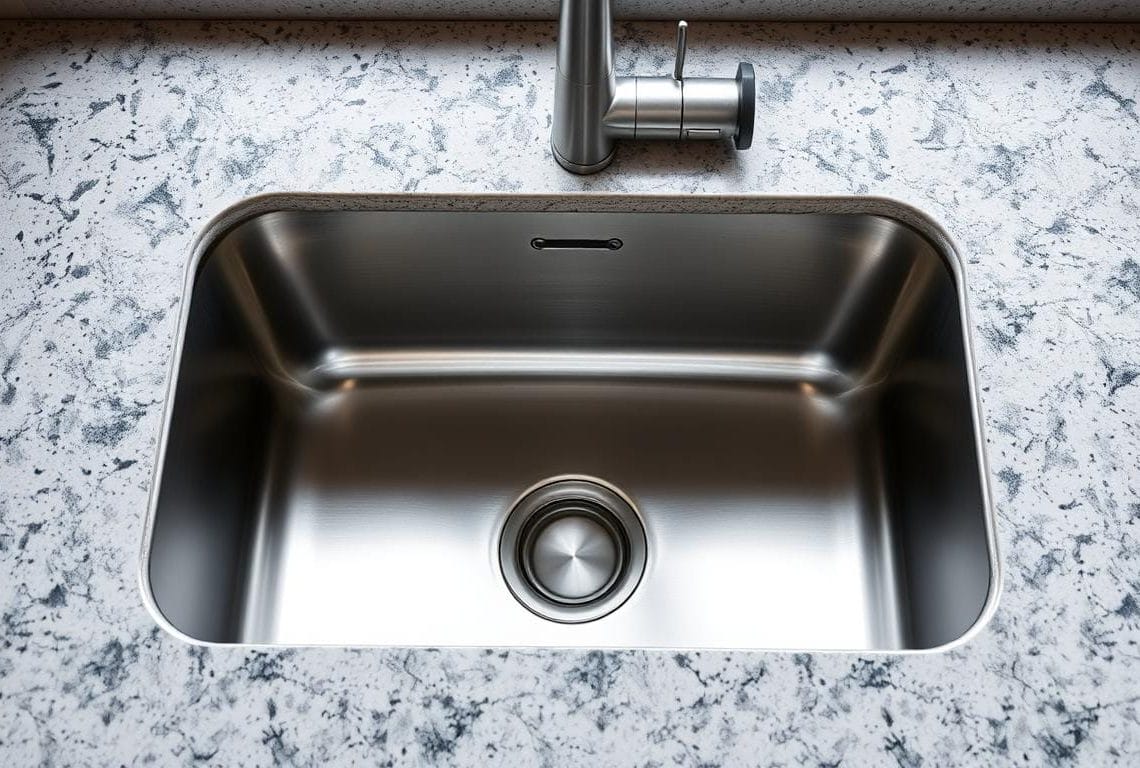
Undermount prep: support, sealing, and fasteners
Dry-fit the bowl—Houzer LTS-2522-1 (25″ x 22″ x 12″, 18-gauge T304) is a good reference for cabinet depth and gauge expectations.
Use brackets or a support frame while sealant cures. Tighten clips in a star pattern to avoid distortion. Check the reveal: flush, positive, or negative—adjust before final torque.
Drain alignment, strainer fit, and noise reduction pads
Plan the drain and strainer: confirm disposal fit, gasket orientation, and P-trap alignment so pipes are strain-free. Rear-set drains free cabinet storage; re-measure trap arm height if switching layouts.
Noise control: verify factory pads or add aftermarket damping, especially when a disposal is used. Finish with a water test—fill the bowl, inspect the rim and drain for leaks, then reinstall grids and strainers to confirm fit and door clearance.
Bar, Laundry, and Utility Sinks for the Whole Home
Compact bar and utility bowls add targeted function across entertaining, laundry, and prep zones.
Why add a secondary bowl? It frees the main kitchen for heavy prep during gatherings and keeps chores separate.
Household examples: Houzer models like 1515-6BS-1 and CS-1307 fit tight bar cabinets. For utility tasks, the LTS-2522-1 (25″ x 22″ x 12″, 18-gauge T304) offers rugged depth for soaking and bucket filling.
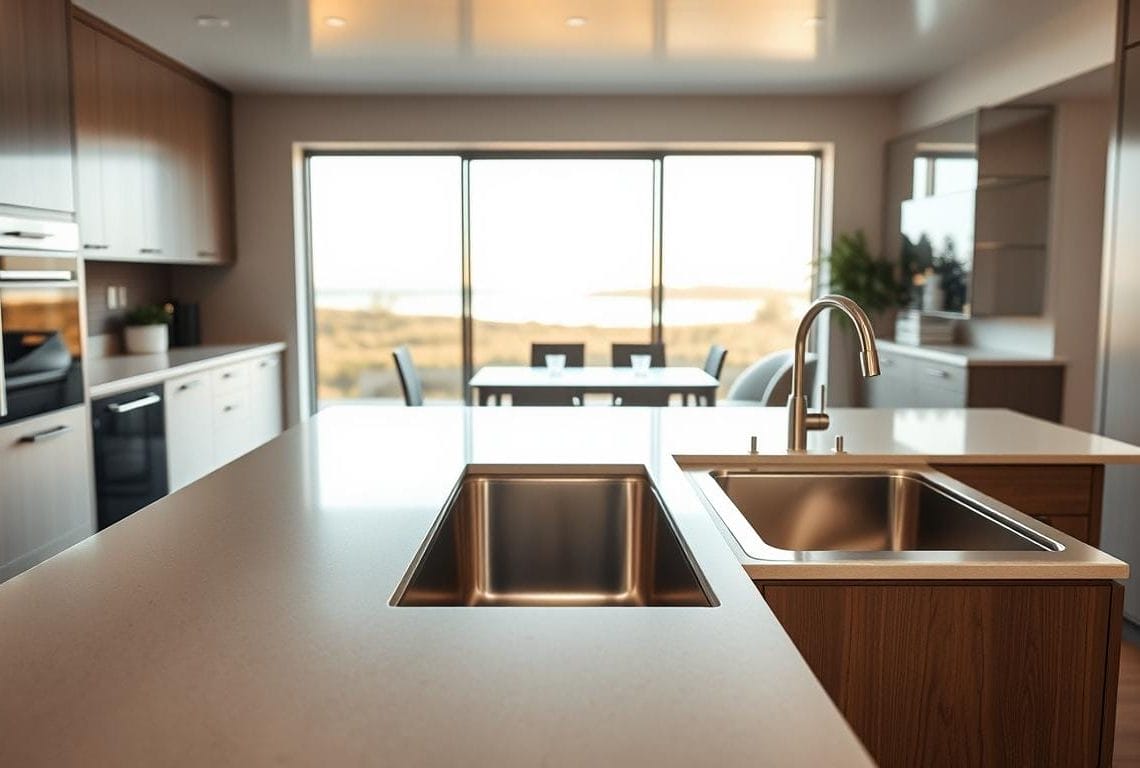
- Mounting choices: top-mount eases laminate retrofits; undermount suits stone bars and a refined look.
- Accessory efficiency: bar grids protect glassware; larger utility strainers trap debris and simplify cleanup.
- Plumbing & ADA: confirm drain sizes and accessibility—Houzer’s A1722-7BS-1 shows ADA-friendly options.
- Finish consistency: match satin grain and direction across kitchen, bar, and laundry for cohesive style.
Plan cabinets to keep storage and trap access clear. Add a backsplash or wall guard behind deep laundry bowls to reduce splash during heavy use.
Value note: secondary installations save time during events and handle tough utility tasks, making them a practical upgrade for any home.
Learn more about material choices and specs at stainless steel for sinks.
Undermount vs. Top-Mount: Design, Functionality, and Use
Choose the mounting style that matches your countertop and daily habits—this choice shapes cleaning, edge detail, and long-term maintenance.
Counter compatibility: stone, quartz, laminate
Undermount pairs best with stone and quartz. It creates a flush, wipe-in edge that keeps crumbs off the counter. Kohler Vault models offer both top-/undermount options, so homeowners can match new bowls to existing surfaces or to a retrofit plan.
Top-mount excels on laminate and thin counters where preserving the surface integrity matters. If you need a fast swap without cutting a new profile, choose a model that supports both installs.
Cleaning, edge profiles, and splash control
Cleaning realities: undermount installations with a positive or flush reveal reduce trapped debris and make wipe-downs easier. Top-mount rims need occasional caulk refreshes to prevent seepage.
Edge choices—positive, flush, or negative—affect crumb control and rim protection. Negative reveals hide the rim but need polished undersides for a refined finish.
Depth influences splash: Short bowls (~7″) suit bars; Standard depths (9″ and larger) cut splash and help with large pots. A deeper double bowl layout with Smart Divide supports two users and reduces splash when rinsing.
- Functionality cue: double bowl Smart Divide options work well in both top- and undermount forms.
- Structural note: heavier gauge keeps rims truer during tightening—important for both top-mount flanges and undermount clips.
- Maintenance: plan caulk checks for top-mounts; undermounts need a careful initial seal.
Decision prompt: consider who uses the bowl, how often heavy pots are cleaned, and whether wipe-in cleanup or quick retrofit is the priority. For a compact guide to choosing between mounting methods, see this undermount or top-mount comparison.
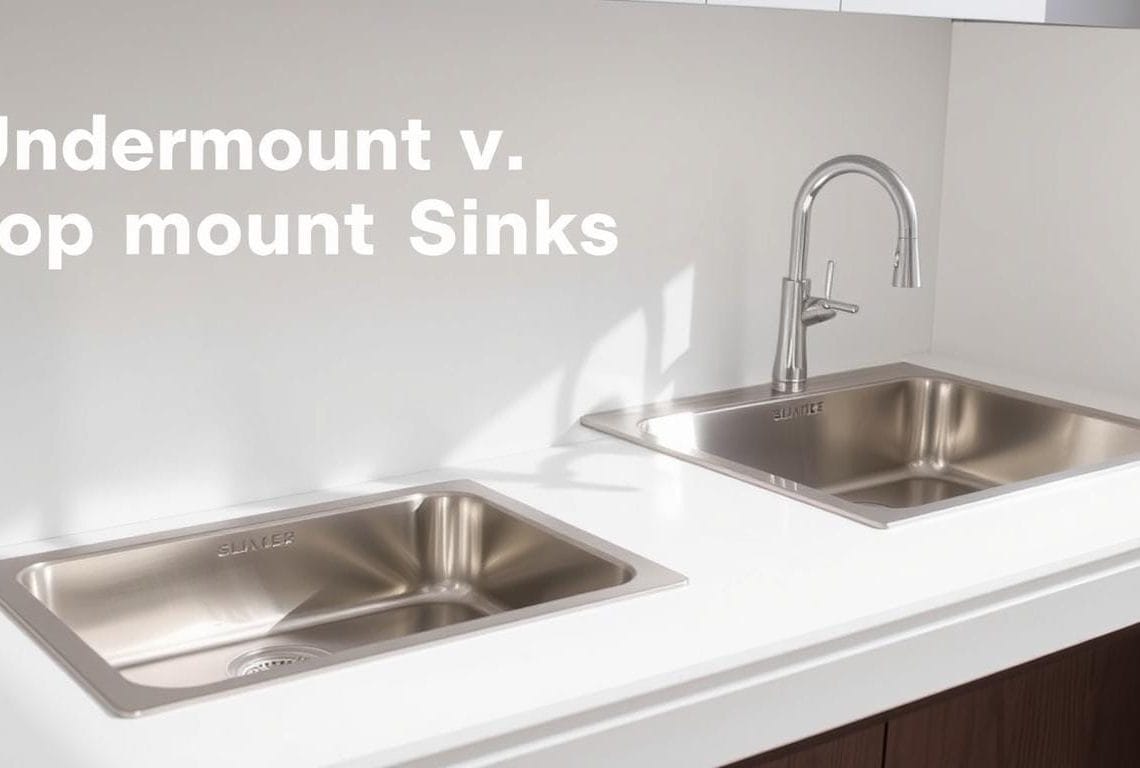
Workstation Sinks and Accessories to Elevate Your Prep
Sliding cutting boards and over-the-bowl racks let homeowners prep, drain, and transfer in one smooth motion.
Workstation systems add tiered ledges, sliding decks, and drying trays that keep counters clear and speed tasks. They fit a single bowl design to add levels without upsizing cabinets.
Sliding decks, racks, and integrated drying solutions
Models like Kohler Strive K-33656-PC-NA and K-33657-PC-NA offer generous decks. The Houzer Novus NVS-5200 adds dual sliding tiers at a notable promo price, turning the basin into a full prep station.
Grids, strainers, and compatible faucets
Accessory planning: fitted grids protect finishes and strainers trap debris. Pair with a pull-down sprayer or semi-pro faucet for full bowl coverage and quick rinsing.
- Integrated ledges support boards, racks, and drying trays.
- Undermount workstation synergy improves hygiene and fast transfer from board to pan.
- Over-the-bowl racks act as draining stations to protect countertops and butcher blocks.
- Choose accessory bundles for matched finish and fit—many brands sell kits to simplify upgrades.
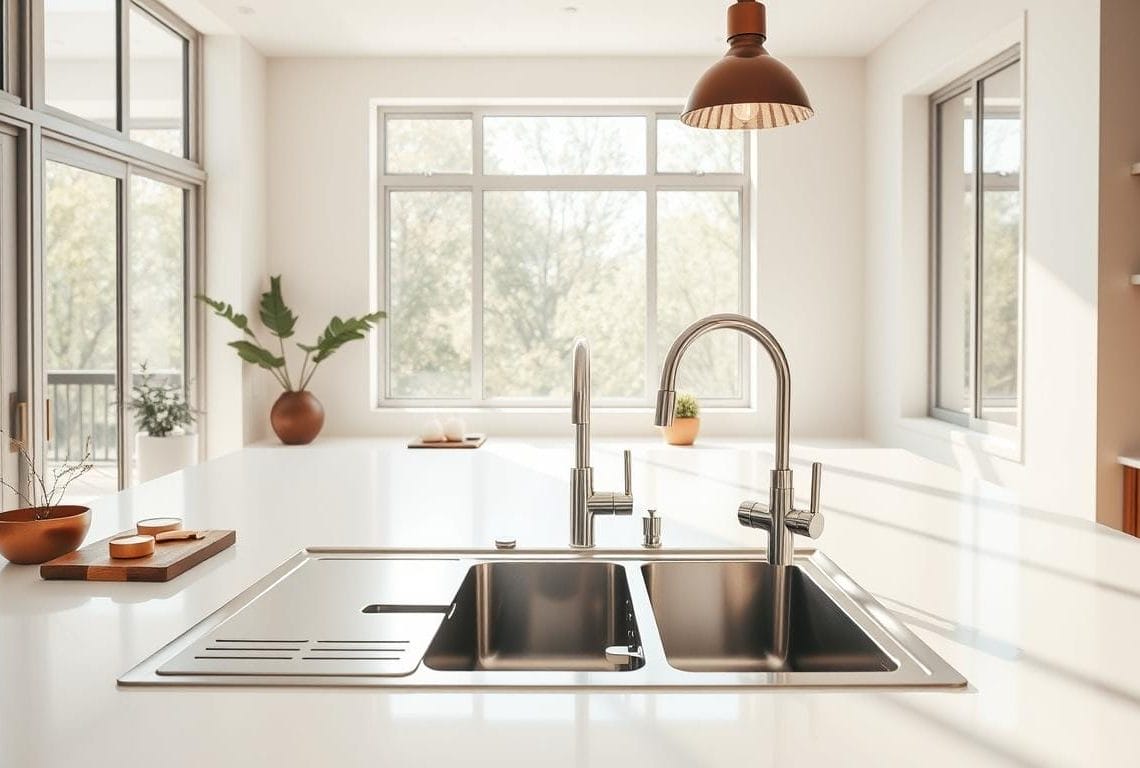
Finishes, Sound-Dampening, and Everyday Durability
A careful finish and the right damping system turn a functional bowl into a quiet, long-lived work surface. This section explains why polish, grain direction, and undercoating matter for appearance and noise control.
Lustrous satin polish and grain direction
Finish choice influences how scratches show and how water beads on the surface. Houzer’s lustrous satin polish reduces micro-scratches and keeps the visible grain uniform.
Wipe and polish along the grain, and align the finish with the primary sightline to improve perceived uniformity. Use a protective grid to limit cookware scuffing on the bowl floor.
Pads, coatings, and measured acoustics
Many models include factory-applied damping pads and spray-on coatings to cut vibration from running water and disposals. Thicker 18-gauge panels transmit less noise and flex, which complements damping materials for better durability.
- Acoustic tip: double bowl layouts isolate sound; a single bowl benefits from full pad coverage.
- Maintenance: mild soap and a soft cloth protect the polish—avoid harsh abrasives.
- Longevity: consistent damping, correct gauge choice, and proper accessories extend useful life and appearance.
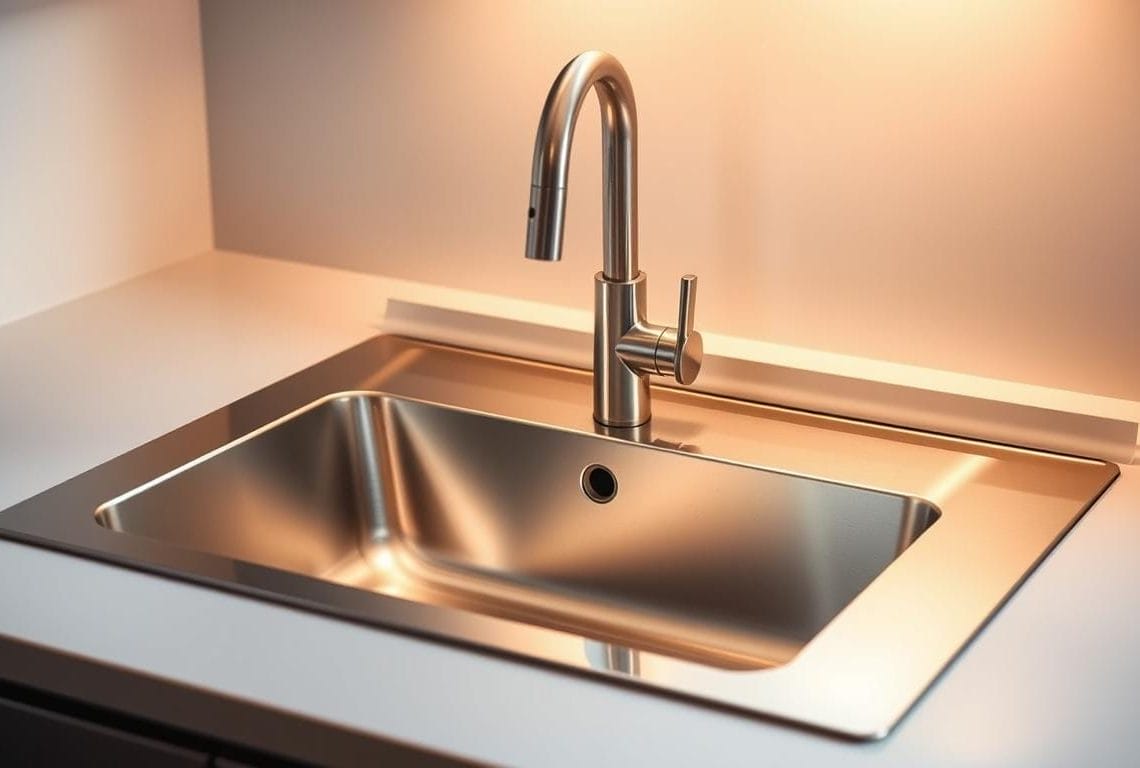
Care & Maintenance Made Simple
Maintaining a bright finish starts with small, regular habits. Daily attention prevents mineral buildup, keeps the finish uniform, and extends the life of the chosen material.
Daily wipe-downs: rinse debris, then wipe with warm water and mild dish soap using a soft cloth. This routine helps a single bowl or double layout resist spotting and grime.
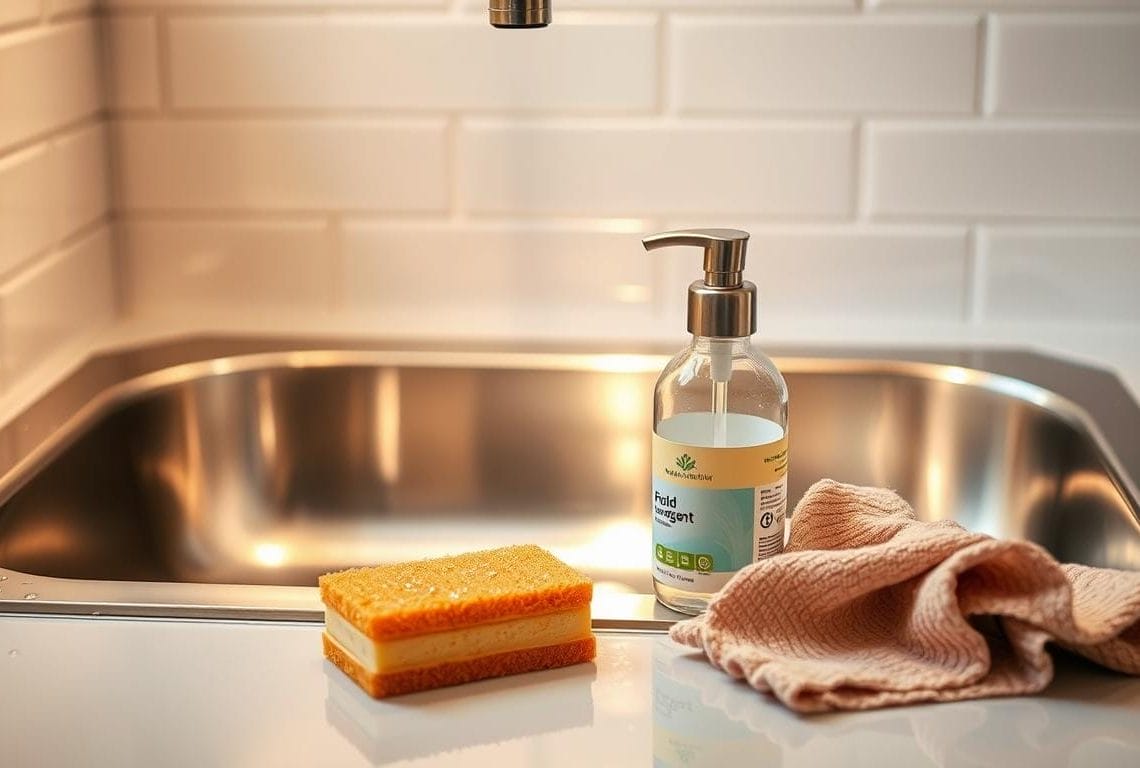
Protecting the finish
Weekly: chase the grain with a microfiber cloth and use a non-abrasive cleaner to restore luster. Avoid steel wool, chlorine bleach soaks, and rough scouring powders that harm the passive layer.
Practical tips and checks
- For mineral spots: apply a vinegar‑water mix, rinse thoroughly, and dry.
- Keep a fitted grid in place to guard the bowl floor from cookware impacts.
- Inspect undermount sealant lines seasonally and reapply if edges show seepage.
- Wash racks and strainers regularly to prevent dulling from trapped residues.
Material note: T304 resists corrosion and bacteria when cleaners are neutral and water does not pool. Finish by towel-drying to reduce spotting—this small habit keeps a stainless steel kitchen looking new even under heavy use.
Ready to Upgrade Your Kitchen Sink Today
A clear plan—measure, shortlist, and confirm mounting—turns an upgrade into a reliable project. Choose a stainless steel sink that matches cabinet size, counter type, and your daily workflow. Kohler Vault and Strive lines offer versatile mounts and workstation options. Houzer ships within the contiguous US and provides free shipping on orders over $50.
Prioritize 18-gauge T304 for long-term durability, low noise, and consistent finish. Verify templates, reveal type, and fastener kits before checkout to avoid surprises on install day.
Shortlist 2–3 models, download spec sheets, and compare included accessories and sound damping. Schedule install support for stone or farmhouse projects if needed—and place the order to transform your kitchen this week.






